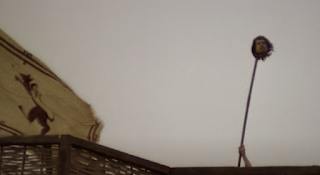They hit the jackpot with Easy Rider in 1969 but spent three times what they took in over the next three years. With blockbusters like The Brotherhood of Satan, I struggled to understand how Columbia was hemorrhaging money. In fairness, Columbia also released The Last Picture Show in 1971. You should watch that one if you love movies. The film was a commercial and critical success and likely fueled a merger with Warner Bros the same year.
Definitely do not watch The Last Picture Show if you are opposed to seeing young Cybil Shepherd topless. I know sometimes I trigger readers with my effervescent verve. They told me all about it during my review at blog corporate last week. Made me drive seven hours.Here is an awesome side-by-side translation bridging 1606 and now. I'd watch a bit, hit pause, and get caught up on the modern translation.
I also linked Roger Ebert's review from New Year's Day, 1971. Ebert was a genius. He was an adjunct lecturer and PhD student at the University of Chicago until he became so successful writing film reviews that he was able to escape the soul-draining clutches of academia. I sat for an hour last week reading his columns. Such craft.
Anyway, you don't need me to summarize Macbeth. The play has been available to the public for the last four hundred and fifteen years and is commonly taught in schools. Plus I provided links.
-----------------------------------------------------------------------------------------------------------------------------
Polanski's three weird sisters are captivating. Their scenes threaten to steal the show.
"KILLING SWINE!!!"
-----------------------------------------------------------------------------------------------------------------------------
Vices are discussed (Modern)...
PRINCE/KING MALCOLM: I know I have so many vices that when people see all of them exposed, evil Macbeth will seem as pure as snow in comparison, and poor Scotland will call him a sweet lamb when they compare him to me and my infinite evils.
Drugs (Modern)...
BANQUO: Were these things we are talking about really here? Or are we both on drugs?
The weird (Modern)...
DOCTOR: Evil rumors are going around. Unnatural acts will cause supernatural things to happen.
Guilt (Modern)...
MACBETH (TO THE GHOST): You cannot say I did it! Don't shake your bloody head at me!
Antisemitism (1606):
THIRD WITCH: Scale of dragon, tooth of wolf, witches mummy, maw and gulf, of the ravined salt-sea shark, root of hemlock digged i' th dark, liver of blaspheming Jew...
The self-harm never stops. Polanski assaults himself with this work. Our hero Macduff is asked by future king Malcolm why he (Macduff) fled to England and left his defenseless wife, children, servants, and castle household behind so they were easy victims for Macbeth's evil men.
All were slaughtered with blades.










